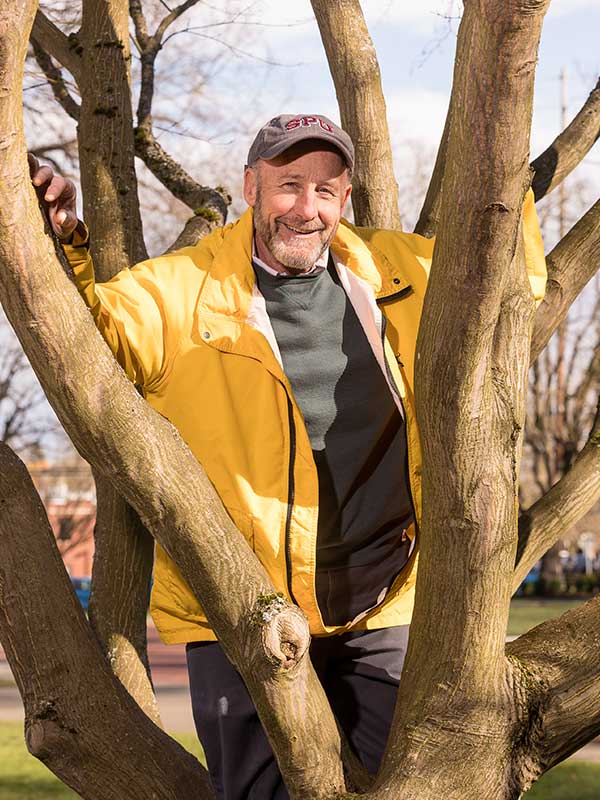Featured image: Jeff Daley is the head of gardening at Seattle Pacific University. Photo Courtesy of SPU
As the excitement of spring spreads across campus, student green thumbs are sharing with the community their love for potted plants, flowering trees, leafy greens and all things growing.
The Garden Club’s community garden, operated and maintained by students, started in 2009 when two students, Alice VanderHaak and Kate Steensma, came to the administration with a plan. VanderHaak, Steensma and facilities cleared a plot on 4th Ave and W. Dravus and soon had the beginnings of a garden.
During the school year, undergraduate and graduate students choose what grows there and volunteer to care for the garden. Eric Long, a biology professor and club director of the Garden Club community garden takes a hands off approach, letting students have creative control over the garden.
“When we have students who are really into it, it can really thrive,” Long says.
Throughout the summer, individual students and local community members volunteer to maintain the garden week-to-week. The garden is open to the public, and produce from the garden finds its way to many unexpected places.
“In the past we’ve partnered with the nutrition department,” said Long, “They do a community kitchen project where they teach underprivileged local people how to cook healthy, nutritious meals for their family, and they’ve used produce from the garden for those meals.”
Dr. J.J. Leese Johnson, a professor in the theology department, uses the garden to apply ecotheology. Johnson and Thomas Parks, an adjunct theology professor, have made the seminary heavily involved in the maintenance and fundraising of green spaces.
In the Global Climate Change class, physics professor Lane Seeley integrates the community garden into the low-carbon meal project. Given a spending budget, students develop a plan to minimize their meal’s carbon footprint, and they eventually estimate the carbon dioxide released in each step of the meal’s production, transport and packaging.
Long also hopes to partner with campus engineering students to design and integrate passive water collection, like a water barrel, with solar-powered irrigation.
On the third floor of Eaton, a student hired by the biology department runs the SPU greenhouse, but it is used by professors and students alike to grow exotic plants.
In June 2018, Haley Ballard took the greenhouse manager role. Recently she finished preparing tomato, pepper and herb starts for the community garden. Her favorite plants are a volunteer moth orchid and an abandoned avocado tree that showed up on the steps with a note.
The greenhouse plant sale, featuring warm-climate plant starts and succulents, is planned for week 8.
Around student rooms and homes, pots are popping up on window sills.
“It brings me so much joy, even when I’m bad at it,” said Emma Daughters, a self-proclaimed student “plant mom.”
Fellow student “plant mother” Lauren Estep finds joy in learning how to raise plants. The death of her first Chinese evergreen, Arlene, was a rude awakening, but Estep says this lead to her learning the right way to raise the plant.
“It’s a very proud moment to see a plant thrive that was previously struggling,” said Estep.
Behind the Ames library a small plot designated the Urban Wildlife Habitat (UWH) in the mid-90s has been mostly undisturbed by humans. At its inception, native trees and shrubs were planted to reflect its natural state.
The UWH plot is used for biology classes, like ecology, where students find abundances of plants, distributions of weeds and diversities of creepy crawlies in undisturbed areas and compare them with human-disturbed areas.
Occasionally, invasive blackberry bushes are physically removed from the UWH to support native plants, but neither irrigation nor pesticides are used to control the plot’s development.
Tim Nelson of the biology department is currently seeking student volunteers to remove invasives from the plot.
In garden beds and pots across campus, beautiful arrangements are popping up. The horticulturist and arborist responsible for this, Jeff Daley, says his love for flowers and eye for the ornamental did not turn him to gardening right away. For a long time, he manufactured jewelry.
During his transition from jewelry to landscape, Daley took classes in horticulture, and after years became a certified professional horticulturist and arborist. His work with SPU’s campus began in 1991.
Since then, Daley has worked to beautify SPU’s campus with landscaping techniques featuring color, texture, movement, rhythm and timing. The variety of plants grown on campus make it a prime location for colleges with horticulture programs to visit for plant identification practice and midterms.
Of plants both big and small, Jeff knows them all. Twelve of Tiffany Loop’s century-old trees hold size records, and SPU’s California valley oak is the second largest of its species in Washington.
In 2016, Daley made cuttings of the Bolleana poplar located by the Loop gate, and a cutting was planted across the Loop as part of a 125 year anniversary of the university. Other commemorative plants grow on campus, including memorial trees, roses displayed at weddings, and the ivy cut by graduating students and returning alumni.
Daley says the last 29 years brought “more shrubs, perennials and trees to work with as our plant palette. Hybridizers have cross bred and found new cultivars, and have grown some amazing plants.”
Daley encourages people to get out and garden. “You just have to roll up your sleeves, get in there, and try different things. Get involved with a gardening group. There’s no strangers, just a few friends who haven’t met.”
“This is an incredible time to garden in the Pacific Northwest, with the new varieties of plants we have that are readily available,” Daley says excitedly.
“God kicked us out of the garden, and we’ve been trying to get back in ever since.”

















































































